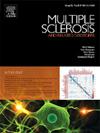Cognitive behavioural therapy for fatigue in patients with multiple sclerosis: A systematic review and meta-analysis
IF 2.9
3区 医学
Q2 CLINICAL NEUROLOGY
引用次数: 0
Abstract
Background
Treatment of fatigue is important for many patients with multiple sclerosis (MS). While pharmacological options have not shown consistent benefit, psychological interventions offer another avenue of treatment. Cognitive behavioural therapy (CBT) involves strategies to change maladaptive cognition and illness behaviours that modulate how patients with MS respond to fatigue. The aim of this study was to perform a systematic review and meta-analysis to determine the effectiveness of CBT for the treatment of fatigue in patients with MS.
Methods
Five databases (Cochrane Central Register of Controlled Trials, MEDLINE/PubMed, Embase, Emcare and PsycINFO) were searched up until 31 July 2023. Randomised controlled trials involving adult patients with MS and fatigue, comparing CBT with another intervention or usual treatment were included. Studies were required to measure fatigue severity and/or the impact of fatigue as the primary outcome(s). Each study was assessed for bias using the Cochrane Risk of Bias tool version 2. Studies with sufficient data were used for meta-analysis to quantify the short- and long-term effects of CBT on MS-related fatigue. The level of certainty provided by the body of evidence was evaluated using the Grading of Recommendations, Assessment, Development and Evaluations (GRADE) framework.
Results
Eight studies were included in the review and six studies contributed to the meta-analysis. Most studies had a low overall risk of bias. CBT interventions differed in the number, duration and frequency of sessions, mode of delivery and therapist. There were significant short- (standardised mean difference (SMD) -0.58, 95% confidence interval (95%CI) -0.85 to -0.31, P-value < 0.0001) and long-term (SMD -0.36, 95%CI -0.52 to -0.19, P-value < 0.0001) effects supporting CBT. The evidence provided a low level of certainty for the short-term effect because of heterogeneity of results and possible publication bias, while there was high certainty for the long-term result.
Conclusion
The study provides secondary evidence that CBT has moderate short-term and small long-term effects in reducing fatigue in patients with MS. CBT should be regarded as a viable evidence-based intervention, particularly in the absence of established alternatives. Future research should identify the ideal characteristics of a fatigue-specific CBT intervention, patient factors that predict treatment response and strategies to maintain initial improvements over time.
针对多发性硬化症患者疲劳的认知行为疗法:系统回顾和荟萃分析。
背景:对于许多多发性硬化症(MS)患者来说,疲劳治疗非常重要。虽然药物治疗并未显示出持续的疗效,但心理干预提供了另一种治疗途径。认知行为疗法(CBT)涉及改变适应不良认知和疾病行为的策略,这些认知和行为会调节多发性硬化症患者对疲劳的反应。本研究旨在进行系统回顾和荟萃分析,以确定 CBT 对治疗多发性硬化症患者疲劳的有效性:检索了五个数据库(Cochrane 对照试验中央注册、MEDLINE/PubMed、Embase、Emcare 和 PsycINFO),检索期截至 2023 年 7 月 31 日。纳入的随机对照试验涉及多发性硬化症和疲劳的成年患者,比较了 CBT 与其他干预措施或常规治疗。研究必须以疲劳严重程度和/或疲劳的影响作为主要结果。使用 Cochrane Risk of Bias 工具第 2 版对每项研究进行偏倚评估。对数据充分的研究进行荟萃分析,以量化 CBT 对多发性硬化症相关疲劳的短期和长期影响。采用 "建议、评估、发展和评价分级"(GRADE)框架对证据的确定性进行评估:八项研究被纳入综述,六项研究参与了荟萃分析。大多数研究的总体偏倚风险较低。CBT 干预疗法在疗程次数、持续时间和频率、实施方式和治疗师方面均有所不同。支持 CBT 的短期效应(标准化平均差 (SMD) -0.58,95% 置信区间 (95%CI) -0.85 至 -0.31,P 值 < 0.0001)和长期效应(SMD -0.36,95%CI -0.52 至 -0.19,P 值 < 0.0001)明显。由于结果的异质性和可能存在的发表偏倚,短期效果的证据确定性较低,而长期效果的确定性较高:该研究提供了次要证据,证明 CBT 在减轻多发性硬化症患者疲劳方面具有适度的短期效果和较小的长期效果。CBT 应被视为一种可行的循证干预措施,尤其是在缺乏成熟的替代方法的情况下。未来的研究应确定疲劳特异性 CBT 干预的理想特征、预测治疗反应的患者因素以及长期保持初步改善的策略。
本文章由计算机程序翻译,如有差异,请以英文原文为准。
求助全文
约1分钟内获得全文
求助全文
来源期刊

Multiple sclerosis and related disorders
CLINICAL NEUROLOGY-
CiteScore
5.80
自引率
20.00%
发文量
814
审稿时长
66 days
期刊介绍:
Multiple Sclerosis is an area of ever expanding research and escalating publications. Multiple Sclerosis and Related Disorders is a wide ranging international journal supported by key researchers from all neuroscience domains that focus on MS and associated disease of the central nervous system. The primary aim of this new journal is the rapid publication of high quality original research in the field. Important secondary aims will be timely updates and editorials on important scientific and clinical care advances, controversies in the field, and invited opinion articles from current thought leaders on topical issues. One section of the journal will focus on teaching, written to enhance the practice of community and academic neurologists involved in the care of MS patients. Summaries of key articles written for a lay audience will be provided as an on-line resource.
A team of four chief editors is supported by leading section editors who will commission and appraise original and review articles concerning: clinical neurology, neuroimaging, neuropathology, neuroepidemiology, therapeutics, genetics / transcriptomics, experimental models, neuroimmunology, biomarkers, neuropsychology, neurorehabilitation, measurement scales, teaching, neuroethics and lay communication.
 求助内容:
求助内容: 应助结果提醒方式:
应助结果提醒方式:


